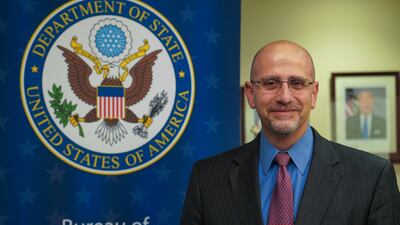It has been a little more than two months since Daniel Shapiro took on his new role as senior adviser for regional integration at the State Department's Bureau of Near Eastern Affairs – a position that is in many ways an extension of his life’s work.
In his first official interview since assuming office in early July, the long-time diplomat sat down with The National to talk about what he hopes to accomplish in his new role.
The veteran Middle East hand has returned to Washington after more than a decade away. From 2011 to 2017, he served as US ambassador to Israel under former president Barack Obama.
He stayed in Israel after his posting ended and most recently served as the director of the N7 Initiative at the Atlantic Council, which seeks to bring together government officials from across the Middle East.
His work at the N7 Initiative served as a natural segue to his current role, in which he will help to steer the Negev Forum, a framework of regional co-operation between the UAE, Israel, Bahrain, Morocco, Egypt and the US, which President Joe Biden's administration helped to establish last year following the success of the Abraham Accords.
Mr Shapiro said he is focused on “trying to make sure [the Negev Forum] continues to advance, continues to be a gathering where the countries that already have these existing relationships can really make the most of them”.
He added that he is keen to grow the forum to include other regional countries, most notably Jordan, which has thus far abstained from joining the pact, despite having nearly three decades of normalised relations with Israel.
“I think all the members of the forum believe that it's important that Jordan be a member, “ he said.
Jordan has so far declined to join the group in a show of solidarity with the Palestinians, who have also declined to participate in any of the forum’s working groups.
Mr Shapiro has jumped into his new role with gusto, already having made several trips to the region, visiting every member of the Negev Forum except for Bahrain – he met Bahraini officials in Washington days after starting the job.
He only recently returned from Jerusalem and spoke to The National from his office inside the State Department in Washington
The new Negev Forum envoy envisions the body eventually transforming into something that resembles the Association of South-East Asian Nations.
“What we really hope this forum will evolve into is a truly, deeply rooted regional integration organisation along the lines of Asean,” he said.
But he acknowledged that the forum still has a long way to go.
“It's not going to happen overnight, or even from one year to the next year,” he said.
“But you put in place the building blocks – that's a goal that would bring a kind of integration and the benefits that flow from it to the Middle East and North Africa that really has never happened.”
Mr Shapiro sees his work developing along two simultaneous tracks: he is in a sprint to advance regional integration as much as possible before the next US presidential election, while concurrently running a marathon and trying to put in place systems and ideas that will outlive any administration.
“I think about this undertaking as the work of decades, and what we're putting in place now, even though some of the changes and developments are extremely meaningful, year to year, month to month,” he explained.
“They're also building blocks for something that could be much larger and much more all encompassing and far reaching.”
The Biden administration, which had been accused of turning away from the Middle East during its first two years, has turned its attention back to the region in recent months.
The administration is hoping to help broker a deal between Israel and Saudi Arabia that would lead to the two countries establishing relations for the first time.
It would be a seismic foreign policy achievement and help to reshape the region, as did the Abraham Accords, through which the UAE and Bahrain established relations with Israel.
“What's clear is that everybody has decided to make a go of this, not that the decisions have been made, but to make a go of the effort,” Mr Shapiro said.
Saudi Arabia has long maintained it would not establish relations with Israel until progress between Israel and Palestinians had been achieved, and the Palestinians are likely to be a considerable factor in any future Israel-Saudi deal.
In 2020, Palestinian leaders rejected the Abraham Accords. But this time around, they appear to be more willing to engage.
“It's noteworthy that the Palestinian leadership has addressed the prospect of Israeli-Saudi normalisation differently than they did when the Abraham Accords were announced,” Mr Shapiro said.
He believes regional integration and finding a solution to the Palestinian-Israeli conflict are not mutually exclusive.
“These two tracks are not at odds with each other,” he said.
“They actually, if properly pursued, can reinforce each other so you can get more integration and more progress on a two-state resolution to the Israeli-Palestinian conflict that actually help each other going forward.”



